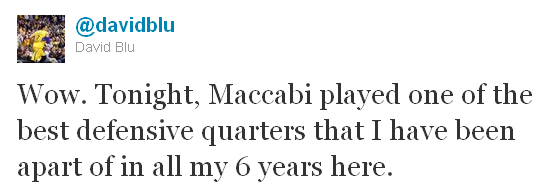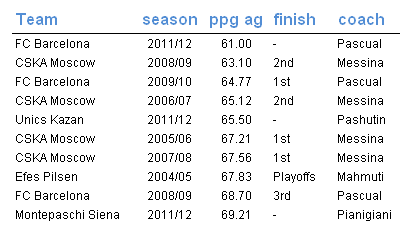Euroleague Top16 Week #4 Notes

The red flags were there.
Real Madrid had conceded more than or close to 90 points four times since the beginning of December, vs Alicante, Estudiantes, Siena and Bilbao on Sunday. The defensive shortcomings culminated in a crushing 69-93 defeat in Bilbao on Wednesday, which hands Bilbao the tie-breaking advantage over Real in Group F.
The game was practically lost after the 14-34 first quarter, the 16-point first leg advantage already voided. The 20 point deficit was a product of hot shooting by Mumbru/Vassiliadis and terrible basketball by Real, with turnovers, miserable shot selection and non-existent backcourt protection. Here’s the list of Bilbao’s first quarter field goals. Seven of their 13 field goals came before the shotclock had turned to 13, four of those directly in fastbreak, leading to ten points. They were 13 of 14 from the field.
| Min | Score | Sec Used | Action | Blame |
| 1 | 3-0 | 15 | Vassiladis fadeaway triple | |
| 2 | 5-0 | 10 | Jackson baseline drive & dish to Hervelle | Llull / Mirotic |
| 3 | 8-0 | 11 | High-Low (Fischer to Hervelle), kickout to Mumbru triple | Begic (?) |
| 3 | 10-0 | 3 | Suarez turnover (Steal Hervelle), Jackson to Hervelle in transition | Suarez |
| 4 | 12-2 | 14 | Mumbru drive & difficult floater over Mirotic | |
| 4 | 14-3 | 9 | Hervelle to Mumbru | Suarez |
| 5 | 17-3 | 17 | Vassiliadis spot up triple | Pocius |
| 5 | 19-8 | 10 | Jackson drives past Begic in PnR | Begic |
| 6 | 22-8 | 3 | Miss, no backcourt protection, Jackson And1 | Carroll / Llull |
| 7 | 25-8 | 5 | Turnover Reyes, Jackson to Grimau, And1 | Reyes / Llull |
| 9 | 29-12 | 2 | Bad shot Llull, no backcourt protection, easy layup Vassiliadis | Llull / S.Rod |
| 10 | 31-14 | 16 | Grimau-Banic PnR | Mirotic |
| 10 | 34-14 | SC off | R.Lopez pull up triple in PnR | S.Rod |
Having four team fouls early doesn’t help. Both and one plays could have been prevented by quick fouls to stop the fastbreak, but Llull and Carroll didn’t want to give away free throws to Aaron Jackson, an 81 percent foul shooter in EL & ACB combined.
Victory over Real does not turn Bilbao into a contender. They’ve had their fair share of problems this season, registering seven wins versus seven losses in the Euroleague and just 10-9 in ACB. But they’re the type of hard-working, enthusiastic bunch you like to see in the playoffs. This is theirs for the grabs now.
Galatasaray: Big win, but biggest game still ahead
Galatasaray grinded out a victory over CSKA – their first defeat in the Euroleague after thirteen straight victories – in admirable fashion. CSKA has been an offensive machine with a 57.2 eFG% that places them among the very elite offenses in modern Euroleague history. Against the Turks, CSKA shot 43.6 eFG% and committed 17 turnovers. Galatasaray prevented CSKA from attacking in transition, keeping the game at a pace of 68 possessions per team, six under CSKA’s usual pace of 74 possessions per 40 minutes.
The fans were phenomenal. Galatasaray fans portray their players as physically stronger and significantly more handsome than their CSKA counterparts. The latter is undoubtedly true.
Galatasaray is last among all sixteen Top16 participants in offensive rating, probably due to a lack of post presence, but they are a solid eighth in defensive rating. This is a well-coached, homogenous team with good characters. They count on their pick and roll offense, but their best post player is a swingman (Lucas). They are second from bottom in shot blocking but fifth in steals.
Kazlauskas did not shift Kirilenko to power forward (just two minutes there) in the absence of Khryapa. Vorontsevich (6 points, 3/9 field goals, 5 boards) played 24 minutes instead. CSKA, Krstic in particular, desperately missed Khryapa’s high-low-passing. In his absence, Krstic had his first single digit scoring game of the Euroleague season.
Before edging CSKA, Galatasaray had lost by four points each to Montepaschi, Unics and Barcelona in the regular season. They are winning games by an average score of 71-68 at home, but losing 67-78 on average on the road. GS will not advance without victory over Olympiakos in Piraeus in Top16 Week 6.
Maccabi: Defense creates offense, but halfcourt playmaking still an issue
Maccabi took the tie breaker over Cantu with a 75-60 victory in Nokia Arena yesterday, which puts them in pole position for the second spot in the group. A home victory next week over Zalgiris means early qualification, if Cantù doesn’t defeat Barça.

Cantu went into half time with a 41-39 lead before a 23-5 third quarter blew the game wide open. Theo Papaloukas got serious minutes in the first half due to Ohayon’s early foul trouble, with mixed results.
Theo opened with a turnover, then had a solid stretch where he created plenty of good looks (which weren’t always converted), but also missed out on a couple of box outs and committed another turnover before Blatt sent him back to the bench. His 13-minute-appearance didn’t really answer our questions, but I still prefer Papaloukas over Mallet or Langford at point guard. Yesterday, one of either Ohayon or Papaloukas was on the floor for all but three minutes, which also pushed Mallet to off guard and led to eight small forward minutes for Keith Langford.
Yogev Ohayon was huge in the second half. He had four defensive and one offensive rebound in the third quarter, followed by a couple of steals in the fourth. He finished with nine points, six boards, three assists and two steals. The performance is no fluke. He’s third among qualifying point guards in steals percentage (3.7) and first, ahead of the notoriously good rebounder Victor Sada, in defensive rebound percentage. His 17.9 defensive rebound rate edges out centers like Fran Vazquez, Boniface N’Dong, Sofoklis Schortsanitis and Nikola Pekovic.
Several BSL standouts have flourished for Maccabi in the recent past (see Morris, Perkins, Pargo), but Ohayon, even if he had already been a great ball thief for Hapoel Jerusalem the year before, was just a footnote last summer in Maccabi’s big roster reshuffle following the departure of Pargo, Perkins and Eidson. This is a pleasant surprise.
A defensive powerhouse
Barça has kept opponents (most recent: Zalgiris) under 60 points in five of 14 games, including a historical 71-57 over Maccabi at Nokia Arena. They’ve conceded over 70 only three times. I don’t have pace-adjusted defensive stats for other eras, but as far as points per game go, this is, if sustainable, the best defensive performance in modern Euroleague history.

The 2008/09 CSKA Moscow played at a ridiculously low tempo, so it is possible that Pascual’s 2009/10 title-winning Barça is top two in a pace-adjusted format.
Evgeny Pashutin’s Unics Kazan is fifth in opponent points per game, Simone Pianigiani’s Montepaschi 2011/12 tenth, followed by its 2010/11 version on eleven. The 2005-09 CSKA dynasty has all four teams in top seven.
This table is premature, though. Opponent quality matters, all three teams have playoffs and possibly Final Four still ahead.
Elsewhere
Olympiakos made a big step to the quarter finals by pushing Efes practically out of the playoff picture. The Reds need a home victory over Galatasaray to advance. This game will be remembered for Vujacic’s inexplicable decision to foul Sloukas, a man who’s made 37 of his 38 foul shots this season, with the game tied at 65 and 10 seconds to go. Judging by the reactions, it wasn’t quite what they had agreed on in the preceding timeout.
Olympiakos has Panathinaikos on Sunday for the A1 regular season title. And a nine point win in Moscow would take them past CSKA. But that is not possible … or is it?
Bo McCalebb recorded a Euroleague season high when he missed six shots against Unicaja. He made eight, but still!
Blogosphere
- Aito Reneses on Efes vs Olympiakos
- The expectedly competent weekly round up by Yarone Arbel
- Rafa Uehara sees Barça peaking at the right moment
- A EuroCup round up over on Euro-Step
- Euroleague or NBA, Pekovic will deliver if you feed him.
-
such sweet thunder
-
such sweet thunder
-
http://www.in-the-game.org sJacas
-
Anonymous
-
http://www.in-the-game.org sJacas
-
Anonymous
-
Anonymous
-
http://twitter.com/robscott33 Rob Scott